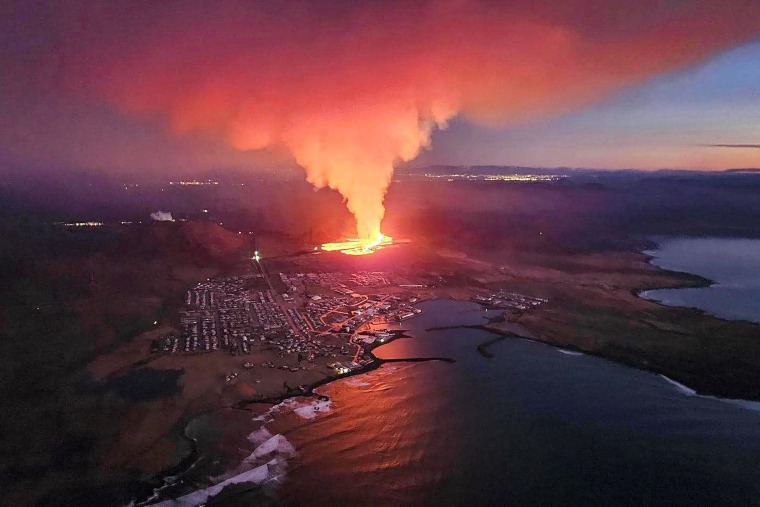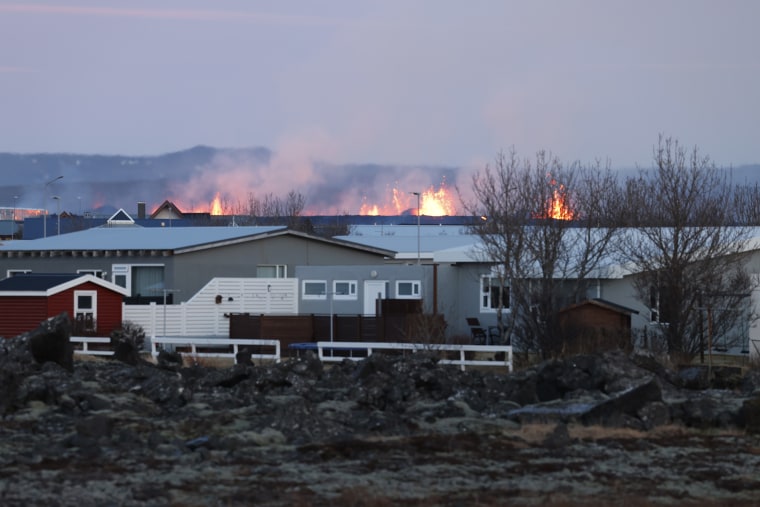Molten lava set houses ablaze in an evacuated Iceland fishing town Monday after a volcano erupted, leaving the country to battle what its president described as “tremendous forces of nature.”
Residents of Grindavik, which had been home to 4,000 people, said they had been glued to livestreams in shock at the bright orange lava consuming their neighborhood.
President Guðni Th. Jóhannesson said in a televised address late Sunday that “a daunting period of upheaval has begun on the Reykjanes peninsula,” where a long-dormant volcanic system has awakened.
A volcano on the peninsula erupted for the second time in less than a month Sunday morning. Authorities had ordered residents to leave the fishing town hours earlier as a swarm of small earthquakes indicated an imminent eruption.

Rakel Lind, 42, a personal trainer from Grindavik, said she never thought this would “happen in a million years.”
“I was raised [knowing] that Reykjanes would crack from Iceland ... but I never thought it was actually going to happen,” Lind said by phone Monday.
Lind, her husband and their three youngest children spent the weekend watching live video of their hometown from the apartment in Reykjavik where they have lived since November, when the town’s residents were first told to evacuate after the Svartsengi volcanic system awakened from almost 800 years of slumber.
The volcano first erupted on Dec. 18, but the lava flowed away from Grindavik and spared the town. Some residents had been allowed to return to their homes on Dec. 22 but were told to evacuate again on Saturday ahead of a new eruption that began Sunday morning. This time, the town is under threat.
Lind said that her family already knows their house has been damaged by a new crack in the ground but that they miss their community most, describing it as a "wonderful town with wonderful people," united by its successful basketball team.
"When something happens to another family, we stay together and help each other. Now we're living in Reykjavik. I know nobody. I’m missing that," she said.
Geophysicist Magnús Tumi Guðmundsson said Monday morning that the eruption had “decreased considerably” overnight but that it was impossible to say when it would end.
Since then, emergency workers have been building defensive walls that have stopped much of the lava flow from the new eruption short of the town.
No one has been killed in the eruptions, but a workman is missing after he reportedly fell into a crack opened by the volcano.

“We don’t yet know how this eruption will unfold, but we must still take those actions that are within our power,” said Jóhannesson, the president.
“We continue to hope for as good an outcome as possible in the face of these tremendous forces of nature,” he added. “We will carry on with our responsibilities, and we will continue to stand together.”
Iceland, which sits above a volcanic hot spot in the North Atlantic, averages one eruption every four to five years. The most disruptive in recent times was the 2010 eruption of the Eyjafjallajökull volcano, which spewed clouds of ash into the atmosphere and disrupted trans-Atlantic air travel for months.
The latest eruption isn’t expected to release large amounts of ash into the air. Operations at Keflavík Airport are continuing as normal, said Guðjón Helgason, a spokesman for airport operator Isavia.
